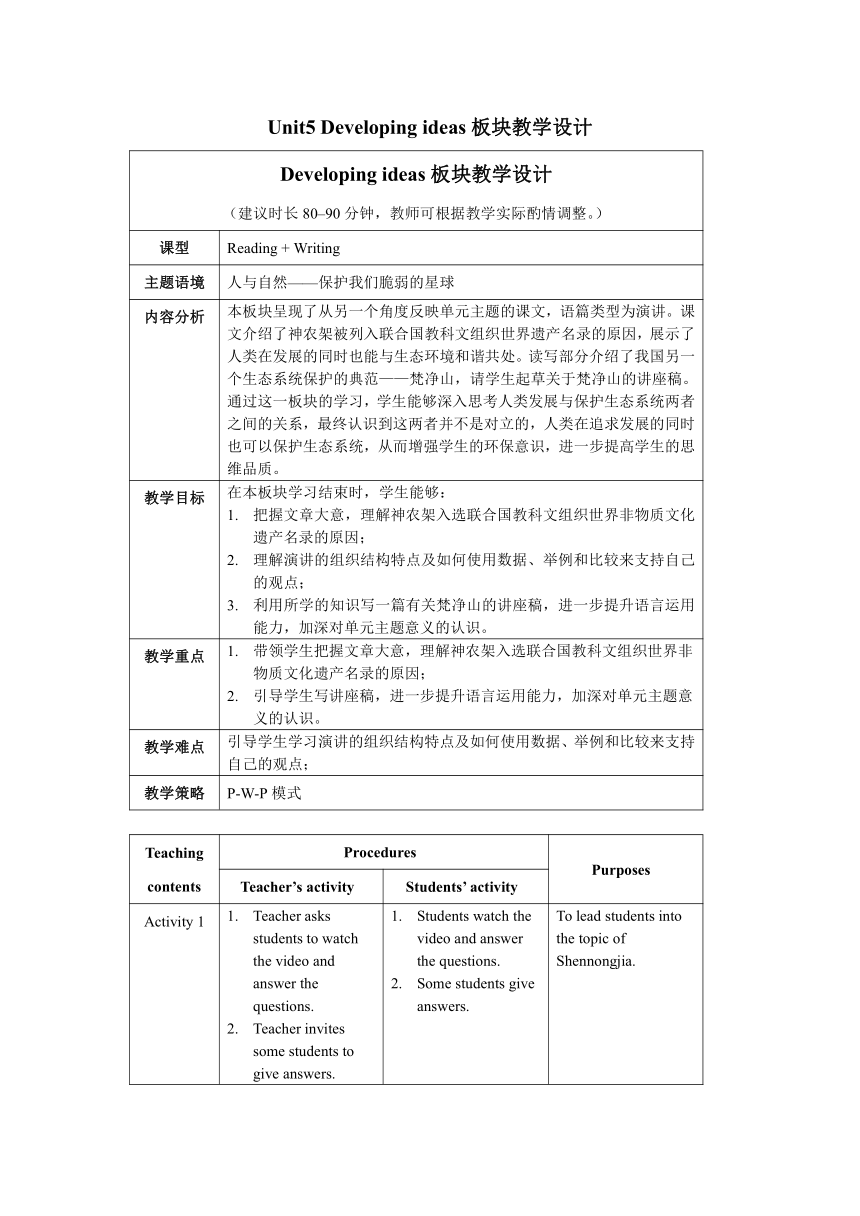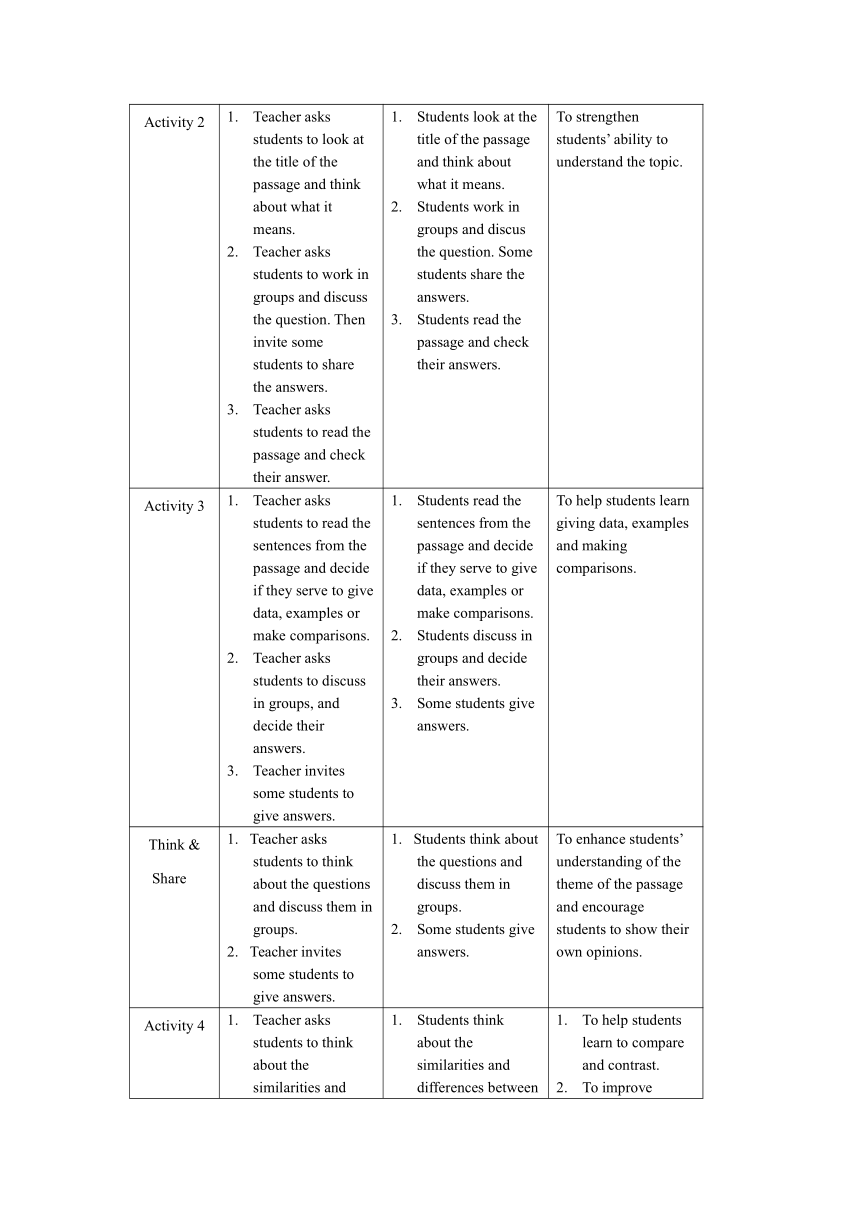外研版(2019)选择性必修第二册 Unit5 A delicate world Developing ideas板块教学设计
文档属性
| 名称 | 外研版(2019)选择性必修第二册 Unit5 A delicate world Developing ideas板块教学设计 |  | |
| 格式 | docx | ||
| 文件大小 | 18.5KB | ||
| 资源类型 | 教案 | ||
| 版本资源 | 外研版(2019) | ||
| 科目 | 英语 | ||
| 更新时间 | 2023-03-04 09:07:51 | ||
图片预览


文档简介
Unit5 Developing ideas板块教学设计
Developing ideas板块教学设计 (建议时长80–90分钟,教师可根据教学实际酌情调整。)
课型 Reading + Writing
主题语境 人与自然——保护我们脆弱的星球
内容分析 本板块呈现了从另一个角度反映单元主题的课文,语篇类型为演讲。课文介绍了神农架被列入联合国教科文组织世界遗产名录的原因,展示了人类在发展的同时也能与生态环境和谐共处。读写部分介绍了我国另一个生态系统保护的典范——梵净山,请学生起草关于梵净山的讲座稿。通过这一板块的学习,学生能够深入思考人类发展与保护生态系统两者之间的关系,最终认识到这两者并不是对立的,人类在追求发展的同时也可以保护生态系统,从而增强学生的环保意识,进一步提高学生的思维品质。
教学目标 在本板块学习结束时,学生能够: 把握文章大意,理解神农架入选联合国教科文组织世界非物质文化遗产名录的原因; 理解演讲的组织结构特点及如何使用数据、举例和比较来支持自己的观点; 利用所学的知识写一篇有关梵净山的讲座稿,进一步提升语言运用能力,加深对单元主题意义的认识。
教学重点 带领学生把握文章大意,理解神农架入选联合国教科文组织世界非物质文化遗产名录的原因; 引导学生写讲座稿,进一步提升语言运用能力,加深对单元主题意义的认识。
教学难点 引导学生学习演讲的组织结构特点及如何使用数据、举例和比较来支持自己的观点;
教学策略 P-W-P模式
Teaching contents Procedures Purposes
Teacher’s activity Students’ activity
Activity 1 Teacher asks students to watch the video and answer the questions. Teacher invites some students to give answers. Students watch the video and answer the questions. Some students give answers. To lead students into the topic of Shennongjia.
Activity 2 Teacher asks students to look at the title of the passage and think about what it means. Teacher asks students to work in groups and discuss the question. Then invite some students to share the answers. Teacher asks students to read the passage and check their answer. Students look at the title of the passage and think about what it means. Students work in groups and discus the question. Some students share the answers. Students read the passage and check their answers. To strengthen students’ ability to understand the topic.
Activity 3 Teacher asks students to read the sentences from the passage and decide if they serve to give data, examples or make comparisons. Teacher asks students to discuss in groups, and decide their answers. Teacher invites some students to give answers. Students read the sentences from the passage and decide if they serve to give data, examples or make comparisons. Students discuss in groups and decide their answers. Some students give answers. To help students learn giving data, examples and making comparisons.
Think & Share Teacher asks students to think about the questions and discuss them in groups. Teacher invites some students to give answers. Students think about the questions and discuss them in groups. Some students give answers. To enhance students’ understanding of the theme of the passage and encourage students to show their own opinions.
Activity 4 Teacher asks students to think about the similarities and differences between Macquarie Island and Shennongjia and make notes. Teacher asks students to discuss their answers in groups, decide the key points and prepare for a talk. Teacher invites several students to give their talk to the class and others to make comments. Teacher asks students to think about how effectively they used the language they have learnt to talk about the similarities and differences. Students think about the similarities and differences between Macquarie Island and Shennongjia and make notes. Students discuss their answers in groups, decide the key points and prepare for a talk. Some students give their talk to the class and others make comments. Students think about how effectively they used the language they have learnt to talk about the similarities and differences. To help students learn to compare and contrast. To improve students’ speaking skill and performance ability.
Activity 5 Teacher asks students to read the passage and think about the questions. Teacher divides the class into groups and asks them to discuss the two questions in groups. Teacher invites one or two groups to share their answers and others to make comments. Students read the passage and think about the questions. Students discuss the questions in groups. One or two groups share their answers and others make comments. To help students learn why Fanjing Mountain was added to the UNESCO World Heritage List.
Activity 6 Teacher asks students to complete the outline based on the information in Activity 5. Teacher asks students to draft their lectures about Fanjing Mountain. Students complete the outline based on the information in Activity 5. Students draft their lectures about Fanjing Mountain. To help students organise the lecture draft before making a lecture.
Activity 7 Teacher divides students into pairs and asks them to make improvements to each other’s lecture drafts. Teacher invites one or two pairs to share their answers to the class and others to make comments. Students work in pairs and make improvements to each other’s lecture drafts. One or two pairs share their answers to the class and others make comments. To encourage students to learn from their partners. To improve students’ writing and speaking skills.
Developing ideas板块教学设计 (建议时长80–90分钟,教师可根据教学实际酌情调整。)
课型 Reading + Writing
主题语境 人与自然——保护我们脆弱的星球
内容分析 本板块呈现了从另一个角度反映单元主题的课文,语篇类型为演讲。课文介绍了神农架被列入联合国教科文组织世界遗产名录的原因,展示了人类在发展的同时也能与生态环境和谐共处。读写部分介绍了我国另一个生态系统保护的典范——梵净山,请学生起草关于梵净山的讲座稿。通过这一板块的学习,学生能够深入思考人类发展与保护生态系统两者之间的关系,最终认识到这两者并不是对立的,人类在追求发展的同时也可以保护生态系统,从而增强学生的环保意识,进一步提高学生的思维品质。
教学目标 在本板块学习结束时,学生能够: 把握文章大意,理解神农架入选联合国教科文组织世界非物质文化遗产名录的原因; 理解演讲的组织结构特点及如何使用数据、举例和比较来支持自己的观点; 利用所学的知识写一篇有关梵净山的讲座稿,进一步提升语言运用能力,加深对单元主题意义的认识。
教学重点 带领学生把握文章大意,理解神农架入选联合国教科文组织世界非物质文化遗产名录的原因; 引导学生写讲座稿,进一步提升语言运用能力,加深对单元主题意义的认识。
教学难点 引导学生学习演讲的组织结构特点及如何使用数据、举例和比较来支持自己的观点;
教学策略 P-W-P模式
Teaching contents Procedures Purposes
Teacher’s activity Students’ activity
Activity 1 Teacher asks students to watch the video and answer the questions. Teacher invites some students to give answers. Students watch the video and answer the questions. Some students give answers. To lead students into the topic of Shennongjia.
Activity 2 Teacher asks students to look at the title of the passage and think about what it means. Teacher asks students to work in groups and discuss the question. Then invite some students to share the answers. Teacher asks students to read the passage and check their answer. Students look at the title of the passage and think about what it means. Students work in groups and discus the question. Some students share the answers. Students read the passage and check their answers. To strengthen students’ ability to understand the topic.
Activity 3 Teacher asks students to read the sentences from the passage and decide if they serve to give data, examples or make comparisons. Teacher asks students to discuss in groups, and decide their answers. Teacher invites some students to give answers. Students read the sentences from the passage and decide if they serve to give data, examples or make comparisons. Students discuss in groups and decide their answers. Some students give answers. To help students learn giving data, examples and making comparisons.
Think & Share Teacher asks students to think about the questions and discuss them in groups. Teacher invites some students to give answers. Students think about the questions and discuss them in groups. Some students give answers. To enhance students’ understanding of the theme of the passage and encourage students to show their own opinions.
Activity 4 Teacher asks students to think about the similarities and differences between Macquarie Island and Shennongjia and make notes. Teacher asks students to discuss their answers in groups, decide the key points and prepare for a talk. Teacher invites several students to give their talk to the class and others to make comments. Teacher asks students to think about how effectively they used the language they have learnt to talk about the similarities and differences. Students think about the similarities and differences between Macquarie Island and Shennongjia and make notes. Students discuss their answers in groups, decide the key points and prepare for a talk. Some students give their talk to the class and others make comments. Students think about how effectively they used the language they have learnt to talk about the similarities and differences. To help students learn to compare and contrast. To improve students’ speaking skill and performance ability.
Activity 5 Teacher asks students to read the passage and think about the questions. Teacher divides the class into groups and asks them to discuss the two questions in groups. Teacher invites one or two groups to share their answers and others to make comments. Students read the passage and think about the questions. Students discuss the questions in groups. One or two groups share their answers and others make comments. To help students learn why Fanjing Mountain was added to the UNESCO World Heritage List.
Activity 6 Teacher asks students to complete the outline based on the information in Activity 5. Teacher asks students to draft their lectures about Fanjing Mountain. Students complete the outline based on the information in Activity 5. Students draft their lectures about Fanjing Mountain. To help students organise the lecture draft before making a lecture.
Activity 7 Teacher divides students into pairs and asks them to make improvements to each other’s lecture drafts. Teacher invites one or two pairs to share their answers to the class and others to make comments. Students work in pairs and make improvements to each other’s lecture drafts. One or two pairs share their answers to the class and others make comments. To encourage students to learn from their partners. To improve students’ writing and speaking skills.
